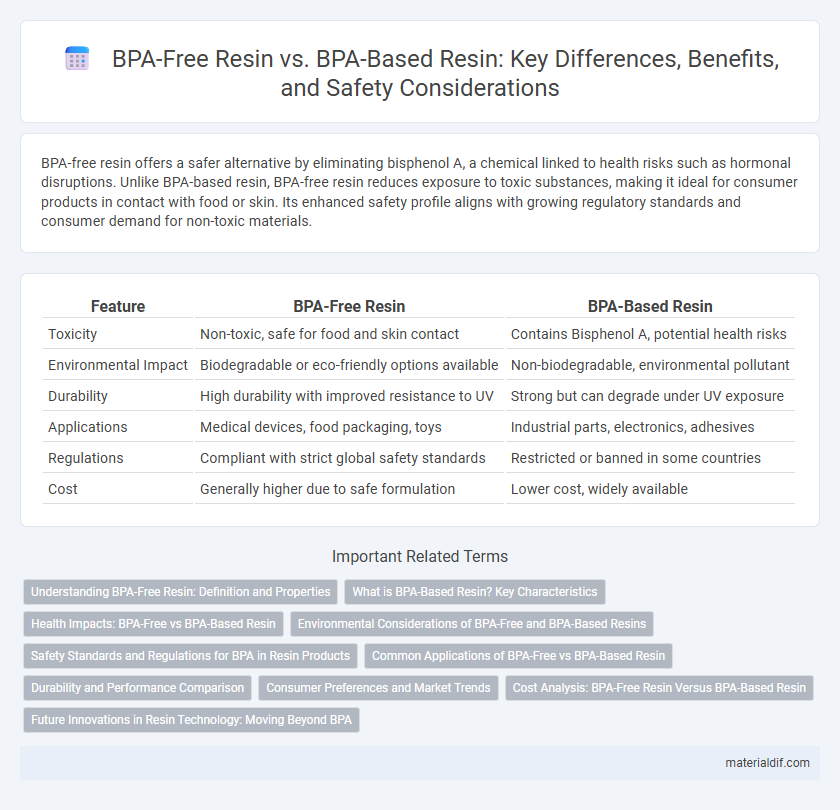BPA-free resin offers a safer alternative by eliminating bisphenol A, a chemical linked to health risks such as hormonal disruptions. Unlike BPA-based resin, BPA-free resin reduces exposure to toxic substances, making it ideal for consumer products in contact with food or skin. Its enhanced safety profile aligns with growing regulatory standards and consumer demand for non-toxic materials.
Table of Comparison
| Feature | BPA-Free Resin | BPA-Based Resin |
|---|---|---|
| Toxicity | Non-toxic, safe for food and skin contact | Contains Bisphenol A, potential health risks |
| Environmental Impact | Biodegradable or eco-friendly options available | Non-biodegradable, environmental pollutant |
| Durability | High durability with improved resistance to UV | Strong but can degrade under UV exposure |
| Applications | Medical devices, food packaging, toys | Industrial parts, electronics, adhesives |
| Regulations | Compliant with strict global safety standards | Restricted or banned in some countries |
| Cost | Generally higher due to safe formulation | Lower cost, widely available |
Understanding BPA-Free Resin: Definition and Properties
BPA-free resin is a type of polymer material formulated without bisphenol A, a chemical known for its potential health risks and endocrine-disrupting effects. This resin offers enhanced safety for consumer products, especially in food packaging, medical devices, and children's toys, by eliminating BPA-related toxicity concerns. Its properties include improved biocompatibility, chemical stability, and environmental friendliness, making BPA-free resin a preferred choice for sustainable and health-conscious manufacturing.
What is BPA-Based Resin? Key Characteristics
BPA-based resin, derived from bisphenol A, is widely used in manufacturing due to its excellent durability, heat resistance, and clarity, making it common in food packaging and consumer goods. Its key characteristics include high mechanical strength, chemical stability, and resistance to impact, which contribute to its versatility in various industrial applications. However, concerns over BPA's potential health effects have led to increased demand for BPA-free alternatives that maintain similar performance without the associated risks.
Health Impacts: BPA-Free vs BPA-Based Resin
BPA-free resin eliminates exposure to bisphenol A, a chemical linked to hormonal disruptions, reproductive issues, and increased risk of certain cancers, making it a safer choice for health-conscious consumers. BPA-based resins can leach bisphenol A into food or drink containers, posing potential endocrine system risks especially in infants and pregnant women. Switching to BPA-free resin reduces health hazards associated with chemical migration, supporting safer applications in food packaging and medical devices.
Environmental Considerations of BPA-Free and BPA-Based Resins
BPA-free resins reduce environmental toxicity by eliminating bisphenol A, a known endocrine disruptor that leaches into water systems and soil during degradation. BPA-based resins contribute to persistent pollution due to their slow breakdown and potential to release harmful chemicals into ecosystems, impacting wildlife and human health. Sustainable resin choices prioritize BPA-free formulations to minimize ecological harm and support safer recycling and disposal practices.
Safety Standards and Regulations for BPA in Resin Products
BPA-free resin complies with strict safety standards and regulations aimed at minimizing exposure to bisphenol A, a chemical associated with health risks such as endocrine disruption. Regulatory agencies like the FDA and EFSA have established limits on BPA content in resin products, prompting manufacturers to adopt BPA-free alternatives to meet safety guidelines. BPA-based resins are subject to ongoing scrutiny and regulatory restrictions to ensure consumer safety, leading to a significant increase in demand for BPA-free resin formulations in various industries.
Common Applications of BPA-Free vs BPA-Based Resin
BPA-free resin is commonly used in food packaging, baby bottles, and medical devices due to its non-toxic and safer profile, avoiding hormone disruption risks associated with BPA. BPA-based resin remains prevalent in applications requiring high durability and heat resistance such as electronics housing, automotive parts, and industrial coatings. The choice between BPA-free and BPA-based resin depends heavily on safety regulations, intended use, and exposure risk to humans, influencing their application across consumer goods and industrial products.
Durability and Performance Comparison
BPA-free resin offers comparable durability to BPA-based resin, exhibiting strong resistance to impact, heat, and chemical exposure commonly required in industrial and consumer applications. While BPA-based resin provides excellent mechanical strength and thermal stability, BPA-free alternatives have improved significantly, often incorporating advanced polymer additives to enhance performance without compromising safety. Performance tests show BPA-free resins maintain long-term structural integrity and resistance to environmental stress cracking, making them a safer yet equally reliable option for health-conscious manufacturing.
Consumer Preferences and Market Trends
Consumers increasingly favor BPA-free resin due to growing awareness of health risks linked to BPA-based resin, prompting manufacturers to innovate safer alternatives. Market trends indicate a significant shift towards BPA-free resin in packaging, particularly in food and beverage industries, driven by regulatory pressures and consumer demand for non-toxic materials. This shift boosts the adoption of sustainable, BPA-free resin formulations that align with eco-friendly practices and stringent safety standards.
Cost Analysis: BPA-Free Resin Versus BPA-Based Resin
BPA-free resin generally incurs higher production costs due to the use of alternative raw materials and more complex manufacturing processes, which can lead to increased market prices compared to BPA-based resin. BPA-based resin remains cost-effective because of established supply chains and lower raw material expenses, making it a preferred choice for budget-conscious applications. However, rising regulatory restrictions and consumer demand for safer products are gradually narrowing the price gap between BPA-free and BPA-based resins.
Future Innovations in Resin Technology: Moving Beyond BPA
Future innovations in resin technology prioritize the development of BPA-free formulations to eliminate health risks associated with bisphenol A exposure. These advanced BPA-free resins offer enhanced durability, chemical resistance, and environmental safety, aligning with stricter regulatory standards. Research is focused on bio-based and non-toxic alternatives that maintain performance while promoting sustainability and reducing endocrine disruption concerns.
BPA-free resin vs BPA-based resin Infographic

 materialdif.com
materialdif.com